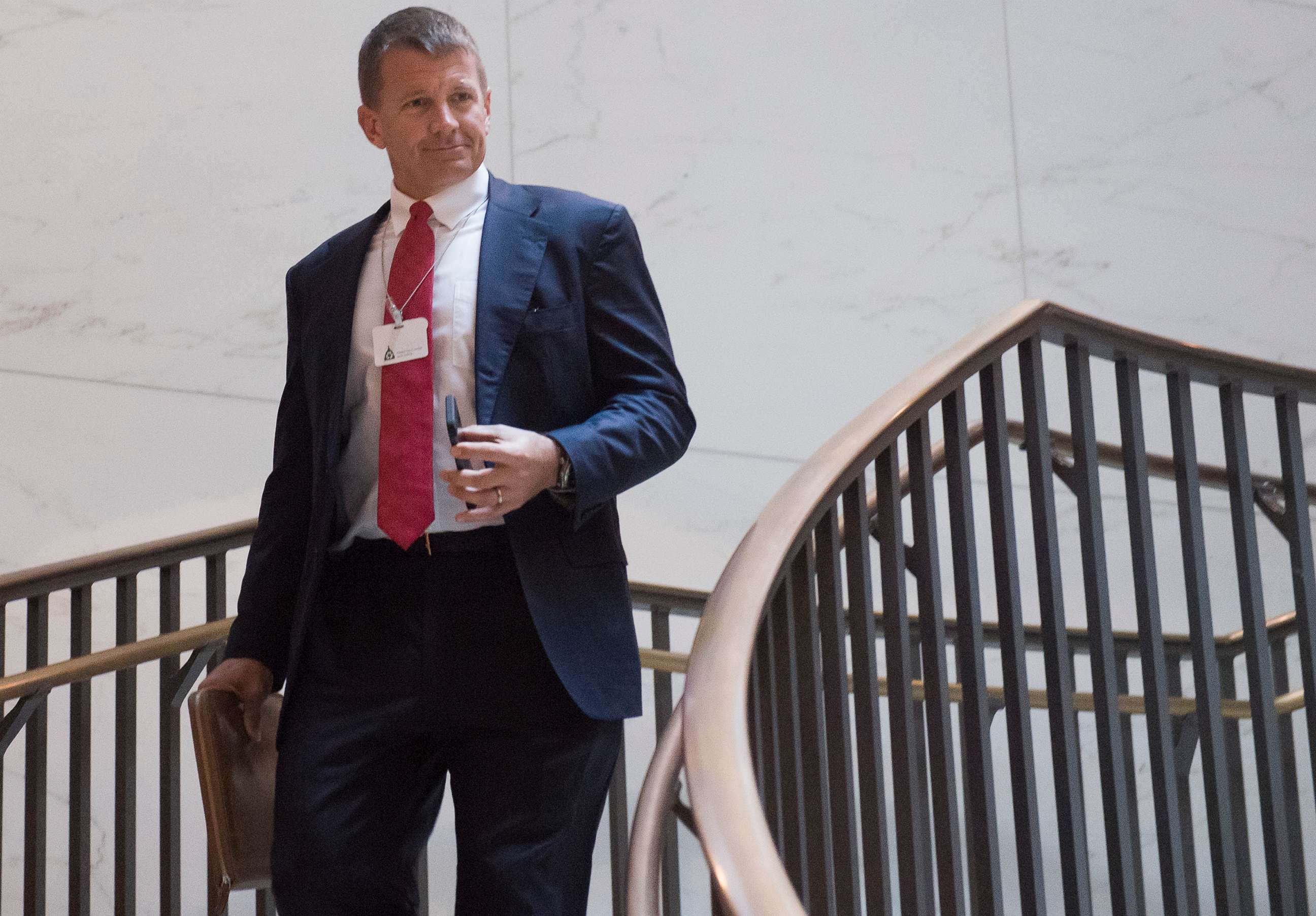Erik Prince's company plans business in China province under human rights scrutiny according to financial disclosure
Prince's company is set to expand into a province described as a police state.
An American citizen stands to profit as his security company expands operations into a Chinese province described as a modern-day police state by human rights activists, and where the Chinese government is detaining up to a million Muslims in "re-education" camps.
Erik Prince, a former U.S. Navy SEAL officer and brother of U.S. Secretary of Education Betsy DeVos, is the deputy chairman and minority shareholder of Frontier Services Group (FSG), a Hong Kong-listed security, logistics and insurance company he co-founded in 2014. Prior to FSG, Prince founded Blackwater, a private military contractor that was mired in controversy for its actions in the Iraq and Afghanistan wars -- specifically when its employees were convicted of killing unarmed civilians.
FSG plans to spend approximately $15.4 (HK$120.8) million in Pakistan and Xinjiang, China by May 2020, according to a recent financial disclosure. The Trump administration announced sanctions this week against multiple Chinese entities tied to Xinjiang, citing the alleged human rights violations taking place in the region.
Earlier this year, Prince told Al-Jazeera that FSG "has zero footprint in Xinjiang, China. Period." However, this new financial disclosure reveals that FSG has been planning to spend millions in Xinjiang since 2018.
The recent disclosure does not specifically outline what these funds would be used for, simply stating the money is for "setting up businesses in Pakistan and Xinjiang, China." Nor does the document disclose how much money has been spent in these areas to-date. A spokesperson for FSG said the company won’t comment beyond what is in the financial disclosure.
However, according to a press release signed by the company’s board in Mar. 2018, FSG planned to spend the same amount ($15.4 million) to establish "training facilities" and buy "security equipment and vehicles" in Pakistan and Xinjiang. Prince told Al-Jazeera the information in this release was incorrect and that the money was for "construction services."
The recent disclosure, issued by FSG’s board of directors on Sept. 23, provides "supplementary information" to FSG’s 2018 annual report, which was published in April of this year. The company’s original 2018 annual report did not disclose any intended funding for projects in Pakistan or Xinjiang, China. FSG’s 2019 interim report also does not disclose any such funding for Xinjiang projects.
Several outlets reported earlier this year that FSG intended to build training centers in Xinjiang, based on another press release from the company -- which has since been removed from its website. Reuters reported in February that, according to this statement, FSG planned to invest 6 million dollars in the Xinjiang training center, which would have had the capacity to train 8,000 people a year.
That same week, a spokesman for FSG told Reuters that the statement was "published in error by a staff member in Beijing" and had been taken off FSG's website. A Prince spokesperson later told Reuters that Prince had no knowledge of the alleged project.
According to company filings, FSG lends its services to companies associated with China’s Belt and Road Initiative (BRI), a $1 trillion global development strategy implemented by the Chinese government to extend its political and economic influence across Asia and into Africa and Europe. Xinjiang and countries neighboring the province, such as Pakistan, are major economic junctures for the BRI.
The Chinese government has faced international scrutiny for its actions in Xinjiang -- specifically for detaining up to a million people from its Muslim population in what human rights experts are calling "re-education camps," while others call them "internment" or "concentration" camps.
Reports also claim that Xinjiang has become a surveillance state, with the government specially targeting the country’s Muslim population.
In May of this year, a FSG spokesperson responded to questions from ABC News regarding the company’s alleged plans to build training centers in Xinjiang, stating “We have no business in Xinjiang and are not building training centres there.”
In an early September interview with Recoil, a firearm and lifestyle magazine, Prince reiterated that FSG was “not building a training center in Xinjiang, China,” adding that the company does not provide training to any Chinese police or military.

However, in 2017, FSG acquired a 25% stake in Beijing’s International Security Defense College (ISDC), which claims to be the largest private security training school in China. The press release added that FSG would provide “world-class training courses” to those enrolled at ISDC.
On its own website, FSG refers to ISDC as “Our Facility,” and offers classes to “regular and reserve law enforcement officers” and “military personnel,” as stated on its enrollment form.
ISDC offers both military and police training, as well as “training and security solutions” for several Chinese entities, including China’s Ministry of Foreign Affairs and China Customs, according to ISDC’s website.
FSG declined to answer questions about discrepancies between Prince’s statement and the company’s policies on training Chinese police and military.
Prince last made headlines in April when the Mueller report claimed he provided some funding for a secretive effort to obtain Hillary Clinton’s private e-mails from “dark web” operatives. ABC News learned earlier this year that Special Counsel Robert Mueller was particularly interested in a 2017 meeting between Prince and a Russian financier with ties to the Russian government.
The Chinese government acknowledges the existence of camps located throughout its Xinjiang Province, but dubs them "vocational centers" -- aimed at combating “extremist thoughts,” according to officials who work in the centers.
ABC News has reported on several accounts of torture taking place within some of these facilities. The Chinese government has denied all allegations of torture within these facilities.




